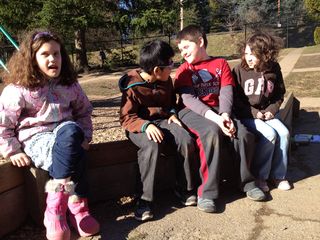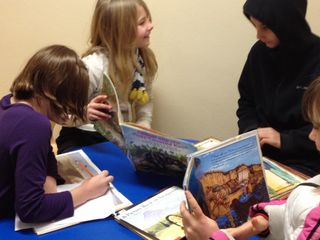The work of group dynamics

In every community, there are different roles people take on to contribute to the work they are doing together. In our Opal 3 learning community, we have talked about these roles in the following terms:
– Protagonists introduce an idea that they and others can act on
– Followers follow the idea of the protagonist by acting on it
– Interveners can challenge the idea of a protagonist, or introduce a new idea
– Bystanders watch and reflect, but do not act on the idea of a protagonist
Each of these roles can either build or limit the community, and one person rarely stays in one role all the time. In every situation, we can choose the role we play, and can even change our minds in the middle of what's happening.
Our conversations – as a whole class, and in small groups – have been imbued with the language of these roles, as we are learning more about the many ways to play these roles and about who each of us feels most comfortable being. We've also used stories and dramatic scenarios to talk about what each of these roles look like, and how everybody's choices influence what happens in the community.

Two children start making jokes about another student. Who is the protagonist?

Everyone is reading quietly when one student begins to make fun of another student's book. Will there be an intervener?
All of our conversations about these roles fall into the context of considering each child's developing knowledge of themselves in these different roles:
On Friday, February 24, Opal 3 will be spending the day with facilitators from Synergo, an organization that works with groups of all ages to build community through challenging team-building experiences. We will meet with them in the Arboretum for a day of working in small groups with Synergo facilitators. These experiences will build on the community work we have already done in the classroom, and invite them both to bring their gifts and to try out new roles. They'll be encouraged to step out of their comfort zones in a supported way, and better understand themselves and their relationship to others in the class in the process.
Before Friday, I encourage you to ask your child about these roles. Which ones feel comfortable or uncomfortable for them? Have they noticed themselves being in one role more than the others? What role could they try out for the day on Friday with Synergo? This kind of reflection helps us all to learn more about ourselves and to think about how to support each other as our year continues together. Our experience with Synergo on Friday promises to be another important step along the way!
For more information about Synergo, visit their website: http://www.teamsynergo.com/
